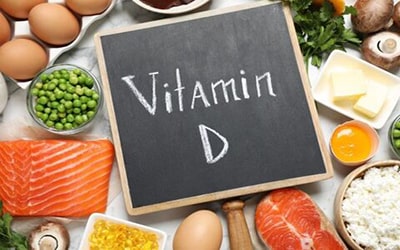world doctors
|
|
Vitamin D: Health Benefits, Facts and Research
|
|
|

|
|
|
|
|
The greatest international website of world doctors:
|
|
|
Vitamin D, also known as the sunshine vitamin, can be produced in the body with mild sun
|
|
|
exposure or consumed in food or supplements.
|
|
|
Adequate vitamin D intake is important for the regulation of calcium and phosphorus absorption,
|
|
|
maintenance of healthy bones and teeth, and is suggested to supply a protective effect against
|
|
|
multiple diseases and conditions such as cancer, type 1 diabetes and multiple sclerosis.
|
|
|
Vitamin D has multiple roles in the body, helping to:
|
|
|
* Maintain the health of bones and teeth
|
|
|
* Support the health of the immune system, brain and nervous system
|
|
|
* Regulate insulin levels and aid diabetes management
|
|
|
* Support lung function and cardiovascular health
|
|
|
* Influence the expression of genes involved in cancer development.
|
|
|
In spite of the name, vitamin D is considered a pro-hormone and not actually a vitamin. This
|
|
|
is because the body is capable of producing its own vitamin D through the action of sunlight
|
|
|
on the skin, while vitamins are nutrients that cannot be synthesized by the body and must be
|
|
|
acquired through the diet or supplements.
|
|
|
It is estimated that sensible sun exposure on bare skin for 5-10 minutes 2-3 times per week
|
|
|
allows the body the ability to produce sufficient vitamin D, but vitamin D has a half-life of
|
|
|
only two weeks, meaning that stores can run low, especially in winter. Recent studies have
|
|
|
suggested that up to 50% of adults and children worldwide are vitamin D deficient. There
|
|
|
are several likely factors contributing to vitamin D deficiency, which will be looked at further
|
|
|
in this article.
|
|
|
Vitamin D is produced when sunlight converts cholesterol on the skin into calciol (vitamin
|
|
|
D3). Vitamin D3 is then converted into calcidiol (25-hydroxyvitamin D3) in the liver. The
|
|
|
kidneys then convert calcidiol into the active form of vitamin D, called calcitriol (1,25-
|
|
|
hydroxyvitamin D3). As such, statins and other medications or supplements that inhibit
|
|
|
cholesterol synthesis, liver function or kidney function can impair the synthesis of vitamin D.
|
|
|
|
|
|
Fast facts on vitamin D
|
|
|
Here are some key points about vitamin D. More detail and supporting information is in the
|
|
|
main article.
|
|
|
* Vitamin D's primary role is to support the development and maintenance of bones and teeth.
|
|
|
* A fair-skinned person with full body exposure to the sun can synthesize up to 20,000 IU of
|
|
|
vitamin D3 in 20 minutes.
|
|
|
* Vitamin D deficiency is common, especially in the elderly, infants, people with dark skin and
|
|
|
people living at higher latitudes or who get little sun exposure.
|
|
|
* Vitamin D deficiency has been seen in up to 80% of hip fracture patients.
|
|
|
* 800IU of vitamin D per day reduces the risk of fracture by 20% in the elderly and decreases
|
|
|
the risk of falls.
|
|
|
* The metabolism of vitamin D may be affected by some medications, including barbiturates,
|
|
|
phenobarbital, dilantin, isoniazid and statin drugs.
|
|
|
|
|
|
|
|
|
|
|
|
|
|
|
|
|
|
|
|
|
|
|
|
|
|
|
|
|
|
|
|
|
|
|
|
|
|